Bradley Byrne: What America said
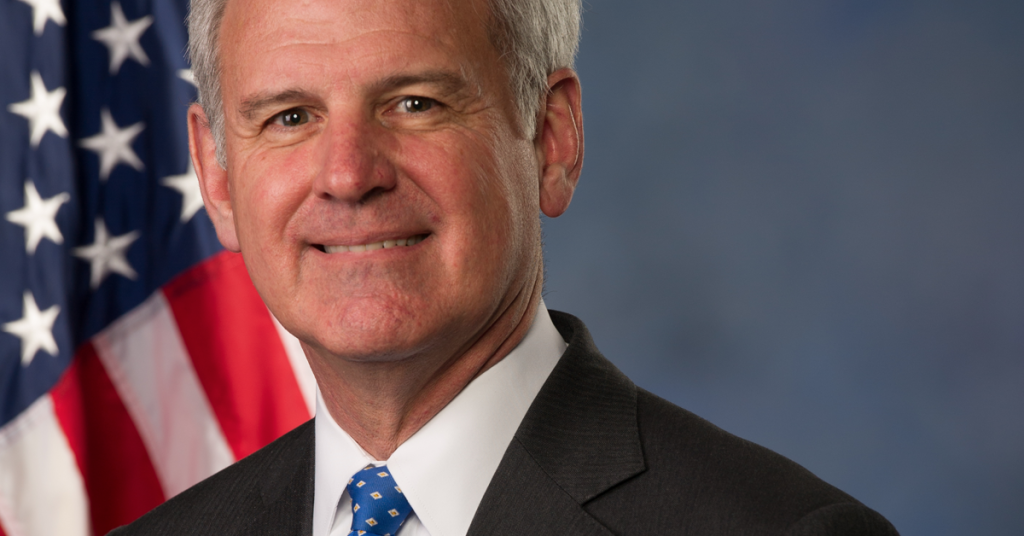
Election Day has come and gone. Despite the fact that multiple national news sites have “called” the presidential election, court cases and recounts are going forward in several states where the margin is less than 1%, and we don’t yet “know” who was elected president. By Federal law, all election disputes must be resolved by December 8 and presidential electors must meet and cast their votes for president on December 14. The ballots will be counted in Congress on January 6. These are the key dates when we will “know” who will become president on Inauguration Day, January 20. So, let’s not jump to a conclusion about who won this very close presidential election just yet. But, we already know some important things about America from the votes last week. Perhaps the most important thing we witnessed was a free and open democracy working. We take for granted our system for choosing our leaders, but if you look around the world, we shouldn’t. Even in a very politically divided nation, we held peaceful elections, and even where there are election disputes, we have legal processes for resolving them. For the most part, things have been handled peacefully, except in a few places like Oregon where they apparently don’t need an excuse to riot. And, while we are divided for sure, there are some things we have agreement on. Despite the now predictable assurances from media “analysts” and other so-called “experts,” there was no Blue wave, no generational realignment of our body politic. The media discovered what the rest of us knew: America is not a left-leaning nation. And demographics aren’t destiny. That’s why an increasing proportion of Blacks and Hispanics are voting their relatively conservative beliefs. As a nation, we don’t want a Green New Deal, Medicare for All, or defunded law enforcement agencies. We aren’t socialists or even socialist leaning. The elections for the two houses of Congress showed a narrowing majority in each. With two special elections for Senate pending in Georgia on January 5, it looks likely that Republicans will hold a very narrow majority in the upper body. That alone guarantees that tax increases, court packing, climate change, government ordered health care, and other far-left proposals of a potential Biden-Harris Administration would go nowhere, an accurate reflection of the national mood. In the House, the Democrats apparently held their majority, but it will be much reduced as Republicans flipped as many as 15 seats and have net gains of 8 to 12. During a post-election conference call last week with her members, Speaker Nancy Pelosi proclaimed that the shrunken Democrat conference had a “mandate” even as Democrats on the call excoriated their party’s policies and messages of the last two years. Don’t let the national media fool you. This isn’t a struggle between moderate Democrats and liberals because there aren’t any moderate Democrats left in Congress after this year’s primaries. This is a fight between liberals and socialists, the two groups that now make up Congressional Democrats. The Republican side is a very different story. Though disappointed that we didn’t retake the majority, we are heartened by our gains and believe we will succeed in the 2022 midterms. Many governorships and statehouses were also elected last week, and they will reapportion their states next year with the census numbers from this year, thus determining the makeup of House districts for a decade. Even though President Obama’s attorney general, Eric Holder, spent enormous amounts of money to get Democrat control of these state houses nationally, his effort failed and Republicans will be in control of states with far more House seats than the Democrats will. By Election Day 2022, the map for House elections will be more favorable to Republican candidates than was the case last week. That Blue wave is actually a firmly rising Red sea in the House. I woke up the day after the election both pleased and disappointed. I wish Republicans had taken the House and had a larger majority in the Senate. And I truly wish we had a clear victory for President Donald Trump, who may still win in the states with recounts and lawsuits. But, America once again proved the experts wrong by saying loudly who we are and who we aren’t. We aren’t socialists or even liberals. We don’t want massive change to our Republic. We won’t let gender, race, religion, or any other demographic category define us, because we are a people free to decide for ourselves what we believe and who we will vote for. We have spoken as a people and we don’t need the news media and entertainment industry to act as if they speak for us. And it’s the job of those who are elected to listen to the people of this country and not the out of touch elites on TV and the internet. Once again, they were wrong. By their votes, the people of America said so. Congressman Bradley Byrne currently represents Alabama’s 1st congressional district.
Randall Woodfin declares Election Day a city holiday in Birmingham
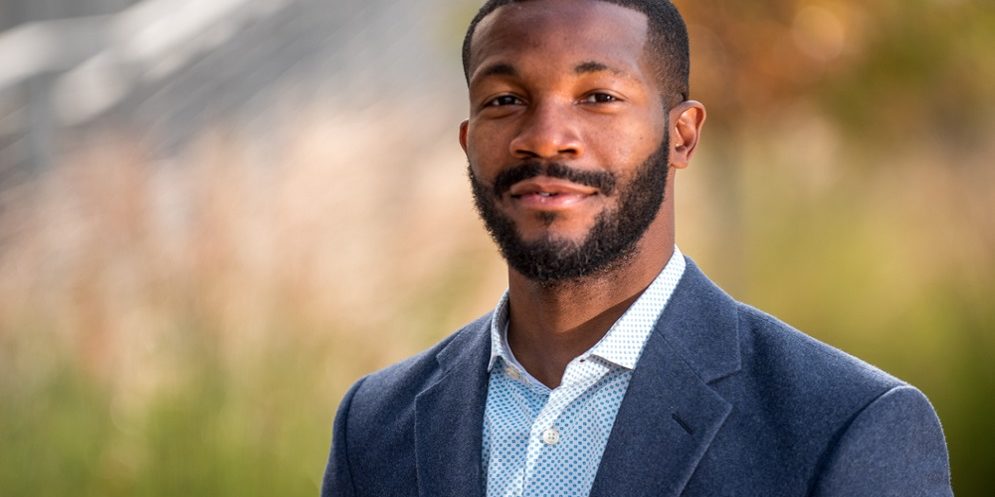
Mayor Randall Woodfin today declared Election day, November 3rd, is now a city holiday. Woodfin has been mayor since 2017. Woodfin, who has been active in working to ensure all citizens are registered to vote, took this commitment to a new level when he declared Election day a city holiday for Birmingham. On his Facebook post, he stated, “It’s always been my belief that a goal of every elected official should be to make voting easier, not harder. Over the past few years, we have seen different tactics used to attempt to erode and make more difficult our ability to vote in this country. To me, that’s just plain unacceptable. That’s why I’m officially making Election Day a city holiday in Birmingham. Making Election Day a day that is free from work should help those who are normally unable to take time off to go vote, particularly employees who work long shifts, have more than one job, and often must balance all of that with childcare. A US Census Bureau survey found that about 14% of respondents, about 2.7 million people, said the main reason they did not vote was because they were too busy to do so. So that’s it. We’re making Election Day a city holiday and instead of a day worrying about trying to carve out time to go vote, we’re turning Election Day into a celebration of our democracy. And if for some reason you still aren’t able to make it out to vote on Election Day, you can vote right now at your county courthouse by in-person absentee ballot. This year more than ever, we need to be breaking down the barriers that prevent our residents from having their voices heard. VOTE.” Other cities and states have worked to make Election day a holiday as well. In April, Virginia Governor Ralph Northam signed a series of laws to expand access to voting. States including Delaware, Hawaii, Kentucky, and New York have also proposed similar laws. State offices typically close, though it depends on the state whether employees are entitled to paid time off to vote. Supporters of these types of laws argue that making it a national holiday would improve voter turnout. “Voting is a fundamental right, and these new laws strengthen our democracy by making it easier to cast a ballot, not harder,” Northam stated. Around 240 million citizens are eligible to vote this year, according to Michael McDonald, who runs the U.S. Elections Project. With one week left before election day, more than 66 million people have already voted – nearly half of the total votes counted in the 2016 general election. That means the total voter turnout could be higher than 62% this year, an increase from the 2016 election.
Election day: here’s what to know before you head to the polls
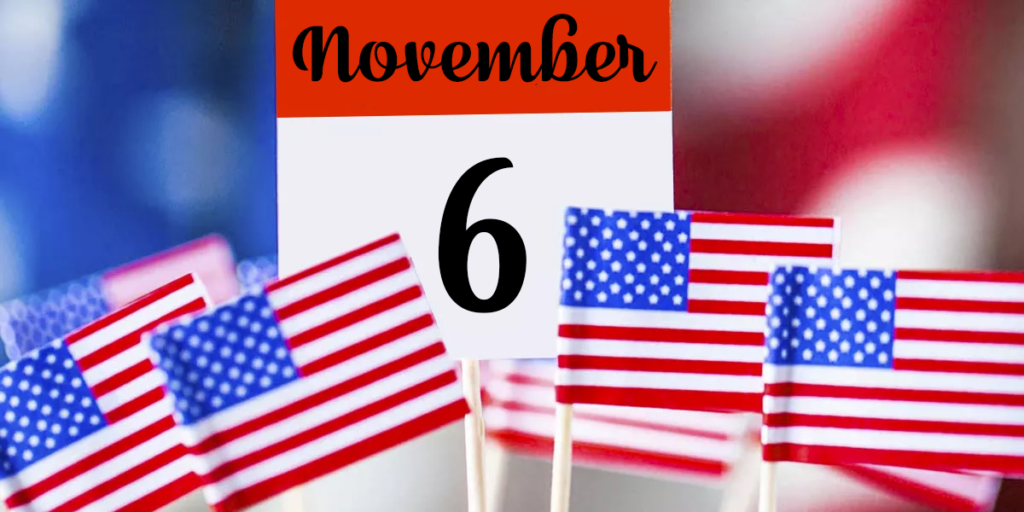
Big decisions will be made Tuesday as Alabamians statewide head to the polls to cast their ballots in the general election. Voters will have from 7 a.m. – 7 p.m. to choose between candidates is races across the state. Here’s what you need to know before you head to the polls: Valid ID A voter can use any of the following forms of photo ID at the polls: Valid driver’s license Valid non-driver ID Valid Alabama photo voter ID Valid state issued ID (Alabama or any other state) Valid federal issued ID Valid US passport Valid employee ID from federal government, State of Alabama, county government, municipality, board, authority, or other entity of this state Valid student or employee ID from a college or university in the State of Alabama (including postgraduate technical or professional schools) Valid military ID Valid tribal ID If you do not have a valid photo ID you may vote only if you are identified by two election officials in the polling place as a voter on the poll list who is eligible to vote and the election officials execute an affidavit stating this. If you do not have a valid photo ID and the election officials are not able to identify you, you must cast a provisional ballot. Polling place Not sure where you vote? You can find your polling place online here by simply entering in the address from which you registered to vote. Sample ballots Your ballot is based on your county and its associated political districts such as School Board, State Legislative Districts, and U.S. Congressional District. You may view the sample ballot for your county here. Candidate profiles. Throughout the election cycle Alabama Today invited all candidates running for office in Alabama this year to complete a questionnaire we believe offers an interesting, albeit, thumbnail sketch of who they are and why they are running. Here are the responses we’ve gotten thus far (includes some primary candidate responses as well). Straight party voting Straight party voting means you simply fill in one bubble next to you party of choice and then you vote is cast every candidate of that particular party, without having to physically mark every candidate. Secretary of State John Merrill issued a statement Wednesday to let voters know that if want to generally vote straight party, but perhaps there’s one race where they’d like to support someone outside of their party, there’s still an easy way to do that. “If a voter wishes to vote for any candidate outside the party that they have chosen, they may do so by marking the space next to the candidate’s name,” Merrill explained in a statement. “Regardless of whether the voter cast a straight party vote or not, filling in the bubble next to a candidate’s name will be counted as the voter’s choice in that contest.” Write-in votes When the candidate you would like to vote for is not listed on the ballot, you may vote for that person by writing his or her name in the blank “write-in” box on the ballot. Each contest on the ballot has a “write-in” box. You must also shade in the circle next to that “write-in” box to ensure your vote is tabulated properly. In the event that the voter selects the “straight-party” option they may still “write-in” a candidate for any race they choose in the blank area designated for “write-ins.” Each vote for a “write-in” candidate will override the “straight-party” vote only for the race with the “write-in” area filled in. Designated “inactive” If you were designated “inactive” you can still cast a ballot on Tuesday, but must first fill out a form at your polling place to update their address. Most of those voters were declared inactive during voter roll maintenance when the state was unable to reach the person with mailed postcards. Alabama voters are listed as inactive after a mailed registration card was returned as undeliverable and they didn’t respond to a second forwarded postcard. People can check their voting information at the secretary of state’s website. Voter fraud If you experience any issues at the polling place contact the Statewide Elections & Voter Fraud Hotline: 1-800-274-VOTE (8683).
Sprint to Nov. 6: The race to frame the Brett Kavanaugh story
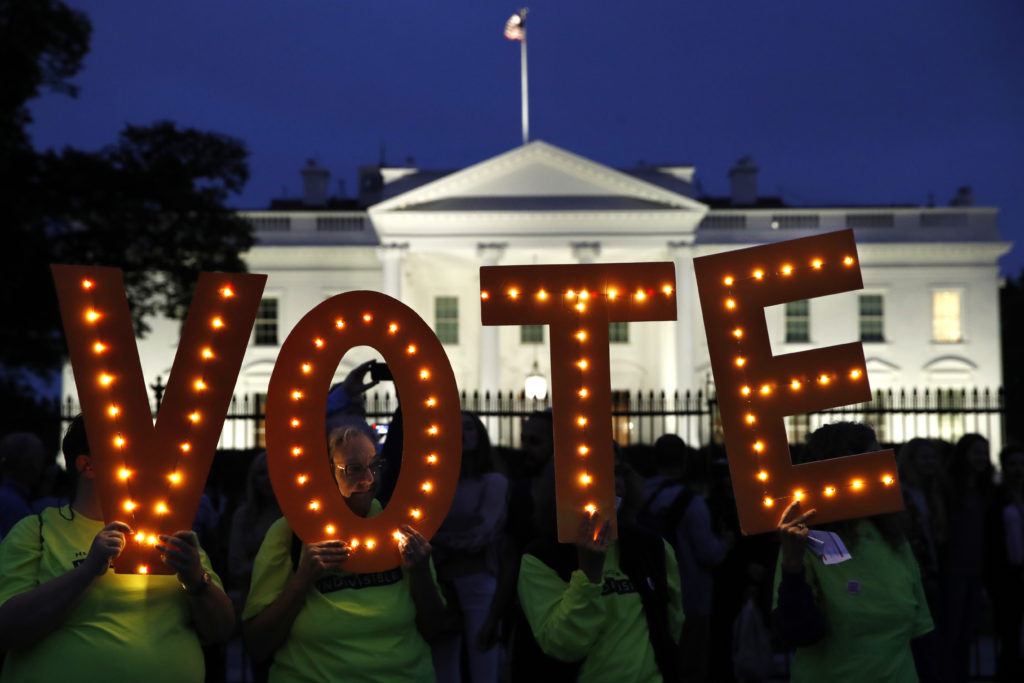
Brett Kavanaugh‘s confirmation to the Supreme Court fired the starting pistol for the final sprint to Election Day in the United States, with control of the House and Senate at stake. The nation’s reckoning with power and who to believe about sexual misconduct has generated a new anger factor among the electorate and made the Nov. 6 balloting a referendum on more than President Donald Trump. What to watch over the final four weeks: ___ KAVANAUGH, TO THE COURT Trump swore in Kavanaugh Saturday as the nation’s 114th member of the Supreme Court after a savage battle that splintered the Senate and riveted the country. Kavanaugh took his oath of office to his lifetime seat just hours after the climactic 50-48 roll call. It was the narrowest Senate vote to confirm a justice since 1881. It was a fitting result for a 100-member chamber that represents a nation deeply split over an array of issues, from health care to who should be considered an American. A yawning divide has opened in the last year over whether allegations of sexual misconduct should be enough to topple accused men from the pinnacle of their professions. Enter Kavanaugh, the appellate court judge accused by Christine Blasey Ford in emotional sworn testimony of sexually assaulting her in the 1980s, while the two were in high school. Accusations from other women followed, none corroborated. Kavanaugh denies that he ever sexually assaulted anyone. In a frequently-shouted sworn statement of his own, he decried the Senate for putting his nomination in jeopardy. Hosting a ceremonial swearing-in for Kavanaugh Monday evening in the White House East Room, Trump declared Kavanaugh had been the victim of a “campaign of political and personal destruction based on lies and deception” and added, “You, sir, under historic scrutiny, were proven innocent.” ___ THE KAVANAUGH EFFECT The Kavanaugh confirmation has blown open the midterm elections from being a national referendum on Trump’s stewardship to a raw emotional discussion over the lack of women in power and how to handle sexual misconduct allegations. With Kavanaugh’s ascension to the high court, Republicans, long dispirited by Trump’s string of scandals and the prospect of losing their congressional majorities, are whooping it up. “It’s turned our base on fire,” Senate Majority Leader Mitch McConnell said. He added Monday that the fight over Kavanaugh, particularly that his nomination was stymied by unproven allegations, injected the GOP with an “adrenaline shot that we had not been able to figure out how to achieve in any other way.” What’s unclear is whether GOP unity is enough to preserve the GOP power in Congress. The same question faces the #MeToo movement against sexual misconduct after the White House successfully argued that the Kavanaugh allegations should not be conflated with the rest of the movement. Even before the confirmation, Kavanaugh’s opponents had a comeback line, printed on the back of jackets they wore to the Capitol: “November is coming.” ___ NORTH DAKOTA Almost immediately after the Senate vote, Democrats felt the chill from faraway North Dakota. That’s the state Trump won by 36 percentage points against Democrat Hillary Clinton in 2016. And even before the Kavanaugh controversy, the Senate race there was among a handful of close contests that could decide whether Republicans keep control of the Senate, where they have a 51-49 majority. Then on Saturday, Democratic Sen. Heidi Heitkamp defied her state’s support for Trump and voted against Kavanaugh’s confirmation. Heitkamp said she was concerned about Kavanaugh’s temperament after his emotional performance before the Senate Judiciary Committee. “Without hesitation,” Heitkamp told reporters, she believed Ford. Polls have put her Republican opponent, Rep. Kevin Cramer, comfortably ahead. He told The New York Times that #MeToo was a “movement toward victimization” that had caused a backlash. “The world got to see close up how ugly it can be when you go too far,” he’s quoted as saying. ___ FRAMING THE STORY Now it’s a four-week race to tell the story. Trump has a busy campaign schedule to spread the word that the allegations against Kavanaugh were a “hoax that was set up by the Democrats” at what he’s called a dangerous time for men who can be falsely accused. “I think you’re going to see a lot of things happen on Nov. 6 that would not have happened before,” Trump said Monday as he departed for an event in Florida. This week alone, he’s expected to hold rallies in Iowa, Pennsylvania, Ohio and Kentucky. McConnell has cast Kavanaugh’s opponents, many of whom protested in the halls of the Senate and yelled at lawmakers, as “the mob.” Democrats are pointing to the Republicans’ handling of the Kavanaugh confirmation as one more reason to oppose the president who nominated him and mocked Ford. “Folks who feel very strongly one way or the other about the issues in front of us should get out and vote,” said Sen. Chris Coons, D-Del., on NBC’s “Meet the Press.” ___ GOVERNORS Look for Kavanaugh’s confirmation to remain a major issue, even though governors don’t have a direct say in the matter. Republican candidates in heavily Democratic states previously called for further investigation of sexual assault claims against Kavanaugh and their Democratic opponents said that wasn’t enough. Democrats are expected to take over some of the governors’ offices now held by the GOP, which controls a near-record 33 offices. Thirty-six states are electing governors this year, with competitive races in states where the Republican incumbents are stepping aside as they hit term limits, including in the swing states of Florida, Nevada and Ohio. The Democratic candidates in Florida, Georgia and Maryland are seeking to be the first black governors there. Republicans, meanwhile, are pushing to pick up seats in increasingly Democratic Colorado and Oregon while keeping them in most of New England as well as the South and much of the West. ___ 2020 CANDIDATES Yep, they’re already running — especially two members of the Senate Judiciary Committee who had visible roles during the Kavanaugh hearings. Sen. Cory
Need a lift? Uber offering free rides to the polls on Election Day
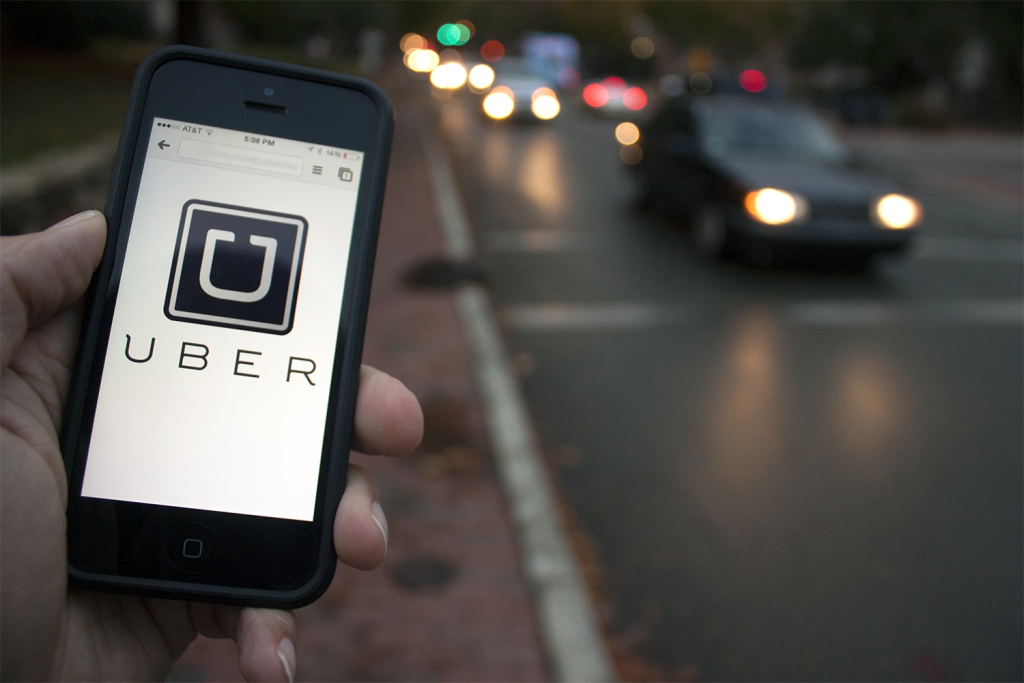
The 2018 midterm elections are just around the corner and if you need a ride to the polls on Nov. 6? Ride-sharing app Uber has you covered. The company is planning to offer free rides on Election Day as part of a larger effort to “drive the vote” by going the extra mile to support the democratic process. To help the millions of Americans who cite transportation barriers as the reason they don’t vote, Uber will be partnering with #VoteTogether and Democracy Works to provide free rides to the polls. Uber’s decisions follows that of its primary competitor, Lyft‘s August announcement that the company will offer riders half-off rides booked anywhere in the U.S. on Nov. 6 in conjunction with Vote.org and TurboVote who will help distribute the nationwide 50 percent off code that can be used within the Lyft app. According to Fortune, Lyft is working with groups such as Voto Latino to help get underserved communities to their polling stations.
Election ahead, Donald Trump’s advisers try to get him to hold back
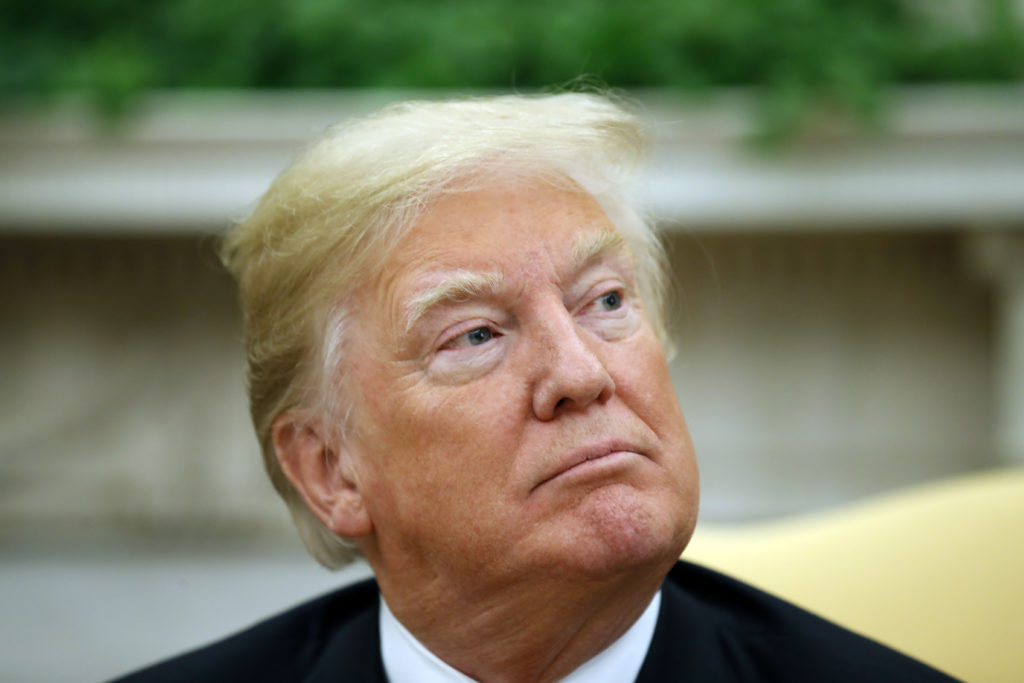
Please, Mr. President, just wait. Donald Trump‘s advisers have been sounding that nervous refrain in the lead-up to the midterm elections, hoping the president will hold off on a series of actions he’s been itching to take, but that could hinder Republicans on Nov. 6. Trump has made clear he would shut down the government if necessary to win money for his long-sought wall on the Mexican border. He’s talked about getting rid of Deputy Attorney General Rod Rosenstein or Attorney General Jeff Sessions. For months, there’s been speculation he’ll make a move against special counsel Robert Mueller. But with 35 days to go before midterm elections that look increasingly challenging for Republicans, Trump allies are trying to hold back the president’s impulses just a little bit longer, hoping to contain his ire until Election Day. For now, Trump has mostly heeded the message. He signed a budget bill last week that will head off a government shutdown at least through Dec. 7, acquiescing to requests from GOP leadership and political counselors to put off a showdown over his proposed wall along the U.S.-Mexico border. Trump has made clear that Sessions’ job is safe — at least until polls close. And while a high-stakes meeting between Trump and Rosenstein looms after an explosive New York Times report, Trump has suggested he’s inclined to keep the deputy attorney general for now. Trump signaled last week that he was likely to hold off on any action related to Rosenstein, saying he would “much prefer keeping” him. That was after Rosenstein denied press reports that he had discussed possibly secretly recording the president and using the Constitution’s 25th Amendment to remove Trump from office. Some around Trump believe that the reports provide a defensible basis for the president to part with Rosenstein even during the final sprint to Election Day. But in recent days the cautious view that Trump should hold off for at least a month has appeared to take hold with the president. Trump acknowledges there are political implications to the timing of his actions. He said Monday he’d love to push for more money for the border wall before the election — “but I don’t want to do that for a different reason: because I have some very fine people that are running in close races, and it may affect them and it may not.” “I happen to think it would be good for them,” he added. While Trump’s reality television flair helped propel him to the White House in 2016, aides and advisers have warned Trump that he needs to lay off the drama — at least temporarily. Even so, Trump can’t resist generating his share of controversy. He drew criticism recently when he rejected the official death count in Puerto Rico from Hurricane Maria. He also has a pre-election to-do list that includes getting embattled Supreme Court nominee Brett Kavanaugh installed on the high court before voters head to the polls. Trump has been urged to be increasingly mindful of the political consequences if Republicans can’t retain their majorities in the House and Senate. Aides have warned of the specter of endless oversight investigations — even impeachment — if Democrats take control of Congress. The effort to contain the president’s impulses comes as the White House has shifted into what aides have described as “political mode” ahead of the elections. The swing is natural for most White Houses leading up to elections, but aides suggested it is more pronounced in the Trump West Wing, where the policy staff has thinned out in recent months. After initially showing little interest in deploying his political capital to help other Republicans, Trump has grown more focused on the fall campaigns, aides say, and views the election as a referendum on his presidency and aggressively hitting the trail for Republicans. He said Monday that his supporters would vote for him — but “Congress is on the ticket.” He added: “I try and tell my people, ‘That’s the same thing as me, in a sense.’” His efforts come as the administration is increasingly anxious about losing the House after a wave of retirements, redistricting and a sustained burst of Democratic enthusiasm. Advisers worry that Trump’s actions may damage or potentially derail struggling Republicans, particularly those in swing districts populated by independent and moderate GOP voters who have turned away from Trump. Other drama they’d prefer to avoid until November is any move against Sessions or Mueller. Trump has railed against his attorney general for months, never forgiving him for recusing himself from the Russia investigation. Despite Trump’s repeated verbal lashings, Sessions has indicated he has no plans to exit the role. While Republicans have worried about Trump taking action, some have indicated recently that he may make a change after the elections. Sen. Lindsay Graham, a South Carolina Republican and Trump confidant, recently told NBC that Trump and Sessions had a “dysfunctional relationship.” “We need a better one. Is there somebody who’s highly qualified that has the confidence of the president who’ll also understand their job is to protect Mueller? Yes, I think we can find that person after the election, if that’s what the president wants,” Graham said. The White House is trying to slow-walk Trump’s response to Mueller’s ongoing Russia probe. In recent months, Trump’s anger at the probe has grown, with the president believing that the special counsel was biased, overstepping his authority and potentially threatening Trump’s immediate family, particularly his eldest son. Trump has complained repeatedly about curtailing the investigation only to be persuaded by a number of his closest advisers, including attorney Rudy Giuliani, not to take the step. Republished with permission from the Associated Press.
Poll: Young people feel anxious about election
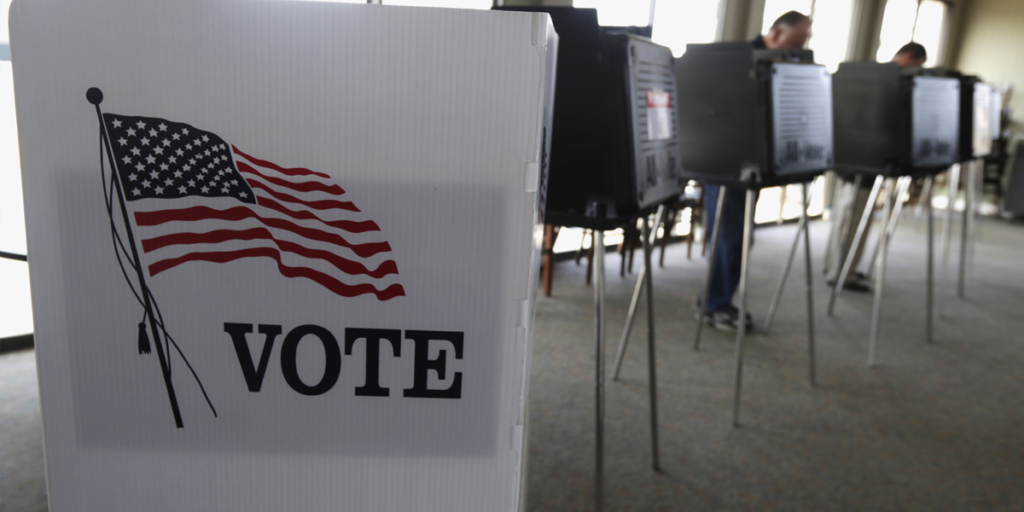
Engaged? Check. Anxious? Check. With weeks to go until the November midterm elections, more young Americans are interested but, according to a new poll, they’re also feeling more anxious about the results. A poll released Wednesday by The Associated Press-NORC Center for Public Affairs Research and MTV found that more young people now say they are feeling anxious about the midterms, compared to July. Nearly half of young Americans ages 15 to 34 now say that they are anxious about the midterms, up from 36 percent in the earlier poll. The increase is most pronounced among young Democrats: 61 percent expressed anxiety compared with 39 percent in July. Young voters could play a critical role in the elections, which will determine whether Republicans will maintain their full grip on Congress. But the big question is whether they will show up to the polls. Young voters rarely turn out in numbers that match their share of the population, especially in years when a presidential candidate isn’t on the ballot. That’s leaving some voters nervous about what to expect. Tia Green, a 33-year-old from Lexington Park, Maryland, said she was worried that the election could inflame an already divided political culture. It’s an issue she’s especially sensitive to after recently seeing posts from a friend on social media that offended her. “In the end, I ended up de-friending her without any confrontation or anything. But I was kind of saddened by it,” said Green, who described herself as a moderate Democrat. “Her views in general were completely disappointing, upsetting and it is hard to deal.” Anxiety about November’s elections also grew among independents: 43 percent now describe themselves as anxious, compared with 31 percent in July. Among Republicans, about one-third say they are anxious about the midterms, roughly the same share that said so this summer. John Laubacker, 32, of Rockport, New York, said he was “appalled” by the state of politics heading into the midterm elections. “Political polarization is at an all-time high. Nobody wants to be civil with anybody,” he said. “Until they figure out that you have to work together whether you like them or not, they’re not going to get anything done.” Laubacker, who identified as a moderate Republican, said he was frustrated by mudslinging by both parties. “You keep hearing, ‘If the Republicans win, the country’s doomed. If the Democrats get enough people in, they’re going to impeach the president,’” he said. “They’re all worried about their own agendas and the agendas of their big-moneyed contributors. Nobody gives a crap about small people anymore.” Though young voters participate in elections at low rates, the poll suggests they are now paying closer attention than they were several months ago. Roughly two-thirds of those ages 15 to 34 now say they are interested in the elections, compared with about 4 in 10 in July. Interest is highest among young Democrats. Seventy-three percent of young Democrats say they are interested in the elections, up from 50 percent in July. A smaller majority of Republicans — 62 percent — say they are interested today, but that’s still up dramatically from 31 percent who said so in July. Young Democrats and Republicans alike say they are more hopeful than they were earlier this year. Over the summer, roughly 4 in 10 in each group said they felt hopeful about the midterms. Now, 58 percent of Democrats and 62 percent of Republicans say they feel that way. Fewer young Americans overall said that they were feeling overwhelmed ahead of November’s elections. Thirty-four percent of those 15 to 34 said they were feeling overwhelmed now, compared with 43 percent earlier this summer. “I’m feeling a little nervous, but cautiously optimistic that things are going to swing in a positive way,” said 31-year-old Ashley Oliver of Kensington, Maryland, who described the political atmosphere as “chaotic” “I’m hoping more Democratic candidates end up in so that we can bring back a little bit of control as to what’s going on,” she said. “Right now, I feel like it’s very chaotic, so I’m hoping that instead of being one-sided, it will be a little more even.” Republished with permission from the Associated Press.
High stakes as 2-month sprint to Election Day begins
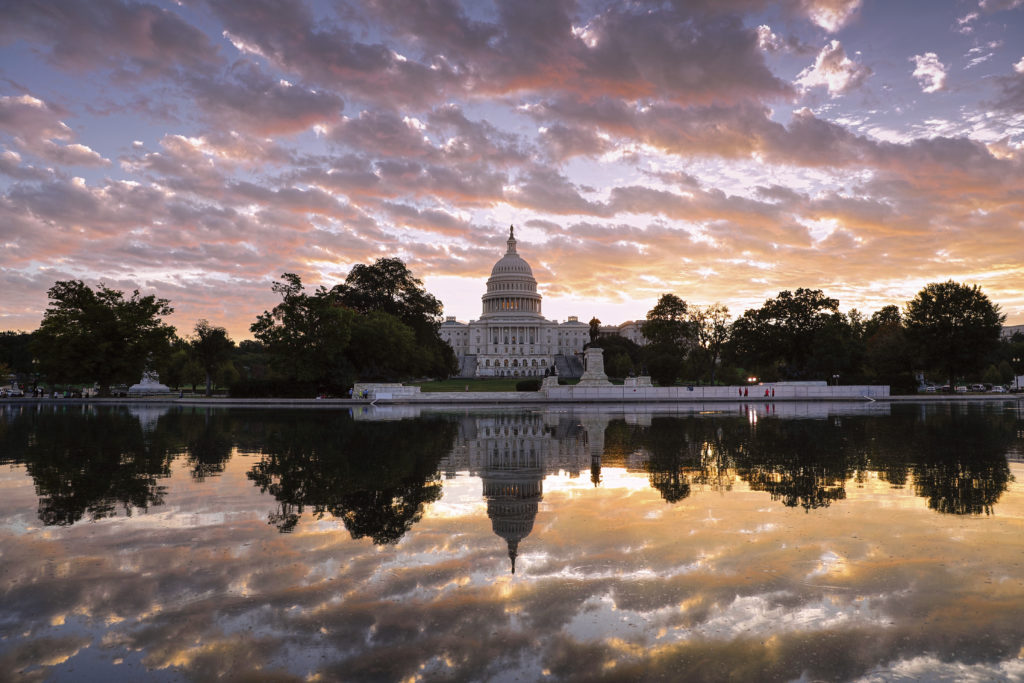
Control of Congress and the future of Donald Trump‘s presidency are on the line as the primary season closes this week, jump-starting a two-month sprint to Election Day that will test Democrats’ ability to harness opposition to Trump and determine whether the Republican president can get his supporters to the polls. For both parties, the stakes are exceedingly high. After crushing defeats in 2016, Democrats open the fall campaign brimming with confidence about their prospects for retaking the House, which would give them power to open a wide swath of investigations into Trump or even launch impeachment proceedings. The outcome of the election, which features a record number of Democratic female and minority candidates, will also help shape the party’s direction heading into the 2020 presidential race. Republicans have spent the primary season anxiously watching suburban voters, particularly women, peel away because of their disdain for Trump. The shift seems likely to cost the party in several key congressional races. Still, party leaders are optimistic that Republicans can keep control of the Senate, which could help insulate Trump from a raft of Democratic investigations. History is not on Trump’s side. The president’s party typically suffers big losses in the first midterm election after taking office. And despite a strong economy, Republicans must also contend with the president’s sagging approval rating and the constant swirl of controversy hanging over the White House, including special counsel Robert Mueller’s ongoing probe into Russian election interference and possible obstruction of justice by Trump. Despite those headwinds, Trump is betting on himself this fall. He’s thrust himself into the center of the campaign and believes he can ramp up turnout among his ardent supporters and offset a wave of Democratic enthusiasm. Aides say he’ll spend much of the fall holding rallies in swing states. “The great unknown is whether the president can mobilize his base to meet the enthusiasm gap that is clearly presented at this point,” said Josh Holmes, a longtime adviser to Senate Majority Leader Mitch McConnell. “Because the middle won’t be there for Republicans.” Indeed, Trump’s turbulent summer appears to have put many moderates and independents out of reach for Republican candidates, according to GOP officials. One internal GOP poll obtained by The Associated Press showed Trump’s approval rating among independents in congressional battleground districts dropped 10 points between June and August. A GOP official who oversaw the survey attributed the drop to negative views of Trump’s meeting with Russian President Vladimir Putin and the White House’s policy of separating immigrant children from their parents at the U.S.-Mexico border. The official was not authorized to discuss the internal polling publicly and spoke on condition of anonymity. Those declines put several incumbent GOP lawmakers at risk, including Virginia Rep. Barbara Comstock, who represents a district in the Washington suburbs, and Rep. Erik Paulsen, whose suburban Minneapolis district has been in Republican hands since 1961. Democrats need a net gain of 23 seats to take control of the House. Operatives in both parties believe at least 40 seats will be competitive in November. Corry Bliss, who runs a super PAC aligned with House Speaker Paul Ryan, acknowledged a “tough environment” for Republicans that could quickly become too difficult for some incumbents to overcome. “Incumbents who wake up down in the beginning of October are not going to be able to fix it in this environment,” Bliss said. “But incumbents who go on the offense early can and will win.” Democratic incumbents had a similar wakeup call during the primaries after New York Rep. Joe Crowley, who held a powerful leadership position in Congress, stunningly lost to 28-year-old first-time candidate Alexandria Ocasio-Cortez. She’s among several younger minority candidates who defeated older, more established opponents, signaling a desire among many Democratic voters for generational change. The result is a Democratic field with more women and minorities on the general-election ballot than ever before, several of whom are poised to make history if elected. Ayanna Pressley, who defeated 10-term Rep. Michael Capuano in a primary last week and is unopposed in the general election, will be the first black woman to represent Massachusetts in Congress. Rashida Talib of Michigan is on track to become the first Muslim woman in Congress. And Stacey Abrams in Georgia and Andrew Gillum in Florida would be their states’ first black governors if elected this fall. Crowley said the wave that led to his own defeat will have long-term benefits for the Democratic Party if it motivates more young people and minorities to vote. “Look at the positives for the country in terms of engagement and the activity that it’s causing and fervor that is forming,” Crowley said. Indeed, turnout for Democrats has been high in a series of special elections that preceded the November contest. Nearly 60 Democratic challengers outraised House Republicans in the second quarter of 2018. And of the 10 Senate Democrats running for re-election in states Trump carried two years ago, only Florida Sen. Bill Nelson has been outraised by his Republican opponent. “We’ve got real wind at our back,” said Tom Perez, the chairman of the Democratic National Committee. “The breadth and depth of the map is remarkable.” Despite Democrats’ optimism heading into the fall, party officials concede that taking back control of the Senate may not be realistic. Unlike the competitive House races, which are being fought in territory that is increasingly favorable to Democrats, the most competitive Senate contests are in states Trump won — often decisively. Democratic operatives are increasingly worried about Sen. Heidi Heitkamp‘s ability to hang on in North Dakota, a state Trump won by 36 points and visited on Friday. Democratic incumbents also face more conservative electorates in Missouri, Indiana and Montana. Still, Democrats believe that if momentum builds through the fall and Trump’s approval rating sinks further, the party could not only hold onto its current Senate seats but also add wins in territory that has long been out of reach, including Tennessee and Texas, where Rep. Beto O’Rourke
Election Day fun: BBQ, ballots and selfies galore
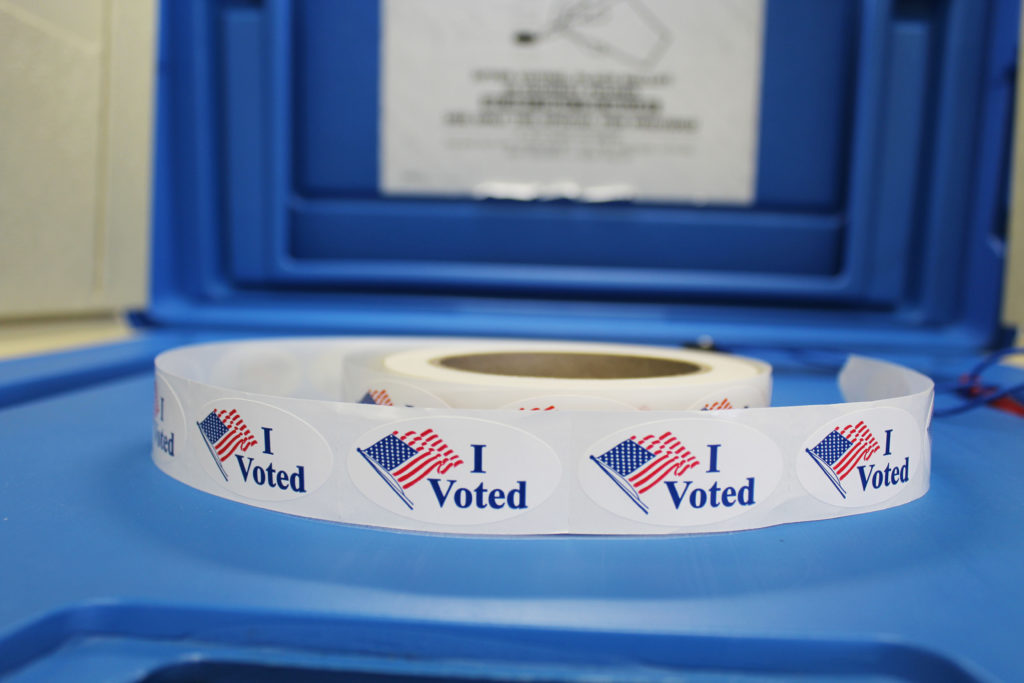
It’s Election Day in Alabama and the candidates are out and about across the state making their final efforts to sway and motivate voters to cast ballots in their direction. Many have taken to social media to keep their potential constituents up-to-date with their efforts. Here’s a look at what some of the candidates have been posting today (in no particular order): Mallory Hagan | Democratic candidate for Alabama’s 3rd U.S. Congressional District Terri Sewell | Democrat and Alabama’s 7th District U.S. Representative Mo Brooks | Republican and Alabama’s 5th District U.S. Representative Kay Ivey | Governor and Republican candidate for Governor Chris England | Democratic State Rep. District 70 You guys know I hate selfies but I know you see the sticker. I voted! Have you??? Let me the sticker! #alpolitics #ivoted #june5primary #yourvoteyourvoice #noexcuses A post shared by Christopher England (@repengland70) on Jun 5, 2018 at 9:12am PDT Joe Siegelman | Democratic candidate for Attorney General Voting felt a little different this time! Please get out to the polls and flex your franchise. They’re open until 7pm! 🇺🇸 A post shared by Joseph Siegelman (@joesiegelman) on Jun 5, 2018 at 6:06am PDT Walt Maddox | Democratic candidate for Governor Walt Maddox and family head to the polls in Tuscaloosa. #primaryelection #alpolitics #tuscaloosa @aldotcomnews A post shared by Ben Flanagan (@thisbenflanagan) on Jun 5, 2018 at 9:13am PDT Tommy Battle | Republican candidate for Governor Eula and I voted this morning. Have you gotten your ‘I Voted’ sticker yet? Get to your polling location before 7pm tonight! Every vote counts in this election—I hope to earn yours. 🚨🚨🚨#VoteToday #BattleforGovernor A post shared by Tommy Battle (@battleforgovernor) on Jun 5, 2018 at 10:28am PDT
Here’s a look at all of the major endorsements in statewide races

Here’s an overview of each the major statewide races by party, then candidate (in alphabetical order). Below we highlight all of candidate’s major endorsements from top well-known groups across Alabama/the country. Names in red link to our “Get to Know” candidate survey, which we believe offers an interesting, albeit, thumbnail sketch of who the candidate is and why they are running. Governor’s race REPUBLICANS Tommy Battle Scott Dawson Endorsed by: Alabama Republican Assembly; BamaCarry Bill Hightower Endorsed by: Alabama Citizens for Life Kay Ivey Endorsed by: Alabama Farmer’s Federation; Alabama Forestry Association; Alabama Citizens for Life; Alabama Grocer’s Association; Alabama Retail PAC; Alabama Trucking Association; Manufacture Alabama; Business Council of Alabama; NRA DEMOCRATS Sue Bell Cobb Christopher Countryman James Fields Walt Maddox Endorsed by: Alabama Democratic Conference; Alabama New South Alliance; Brotherhood of Locomotive Engineers and Trainmen; Central Alabama Labor Council; International Brotherhood of Electrical Workers; Professional Firefighters of Alabama; United Mine Workers of America; West Alabama Labor Council; more. Doug Smith Anthony White Lt. Governor’s race REPUBLICANS Will Ainsworth Endorsed by: Alabama Farmer’s Federation; Alabama Forestry Association; BamaCarry Twinkle Andress Cavanaugh Endorsed by: Alabama Associated General Contractors; Alabama Grocer’s Association; Alabama Associated General ContractorsAlabama Retail PAC; Manufacture Alabama; Alabama Veterinary Medical Association; Business Council of Alabama; Susan B. Anthony List Rusty Glover Endorsed by: Alabama Citizens for Life; Conservative Christians of Alabama; Alabama Republican Assembly DEMOCRATS Will Boyd Secretary of State REPUBLICANS Michael Johnson John Merrill Endorsed by: Alabama Farmer’s Federation; Alabama Forestry Association; Alabama Citizens for Life; Alabama Grocer’s Association; Alabama Republican Assembly; Alabama Retail PAC; Alabama Trucking Association; Business Council of Alabama; Conservative Christians of Alabama DEMOCRATS Lula Albert Heather Milam Endorsed by: Alabama Democratic Conference Treasurer REPUBLICANS David L. Black Stephen D Evans John McMillan Endorsed by: Alabama Farmer’s Federation; Alabama Forestry Association; Alabama Grocer’s Association; Alabama Retail PAC; Business Council of Alabama; Conservative Christians of Alabama; Alabama Trucking Association; DEMOCRATS N/A Attorney General REPUBLICANS Chess Bedsole Endorsed by: Conservative Christians of Alabama Troy King Steve Marshall Endorsed by: Alabama Citizens for Life; Alabama Grocer’s Association; Alabama Retail PAC; Alabama Trucking Association; Business Council of Alabama; Manufacture Alabama; NRA Alice Martin Endorsed by: Alabama Farmer’s Federation; Alabama Republican Assembly; BamaCarry DEMOCRATS Chris Christie Endorsed by: Alabama Democratic Conference Joseph Siegelman Endorsed by: Alabama New South Alliance Commissioner of Agriculture and Industries REPUBLICANS Tracy “T.O.” Crane Gerald Dial Endorsed by: Alabama Citizens for Life; Manufacture Alabama; NRA Cecil Murphy Rick Pate Endorsed by: Alabama Farmer’s Federation; Alabama Forestry Association; Alabama Grocer’s Association; Alabama Republican Assembly; Business Council of Alabama; Conservative Christians of Alabama DEMOCRATS N/A Alabama Supreme Court REPUBLICANS Chief Justice Tom Parker Endorsed by: Alabama Citizens for Life; Alabama Republican Assembly; Conservative Christians of Alabama Lyn Stuart Endorsed by: Alabama Farmer’s Federation; Alabama Forestry Association; Alabama Grocer’s Association; Alabama Retail PAC; Business Council of Alabama; Manufacture Alabama Associate Justice, Place 1 Debra Jones Endorsed by: Alabama Republican Assembly; Conservative Christians of Alabama Brad Mendheim Endorsed by: Alabama Farmer’s Federation; Alabama Forestry Association; Alabama Grocer’s Association; Alabama Retail PAC; Business Council of Alabama; Manufacture Alabama Sarah Hicks Stewart Endorsed by: Business Council of Alabama Associate Justice, Place 2 Tommy Bryan Endorsed by: Alabama Forestry Association; Business Council of Alabama Associate Justice, Place 3 Will Sellers Endorsed by: Alabama Forestry Association; Business Council of Alabama Associate Justice, Place 4 John Bahakel Endorsed by: Alabama Republican Assembly; Conservative Christians of Alabama Jay Mitchell Endorsed by: Alabama Farmer’s Federation; Alabama Forestry Association; Alabama Grocer’s Association; Alabama Retail PAC; Business Council of Alabama; Manufacture Alabama DEMOCRATS Chief Justice Bob Vance, Jr. Endorsed by: Alabama New South Alliance Associate Justice, Place 4 Donna Wesson Smalley Endorsed by: Alabama New South Alliance Court of Civil Appeals REPUBLICANS Place 1 Christy Olinger Edwards Endorsed by: Alabama Farmer’s Federation; Alabama Grocer’s Association; Alabama Retail PAC; Manufacture Alabama Pat Thetford Michelle Manley Thomason Endorsed by: Alabama Forestry Association; Alabama Republican Assembly; Conservative Christians of Alabama Place 2 Chad Hanson Terri Willingham Thomas Endorsed by: Alabama Farmer’s Federation; Alabama Forestry Association; Alabama Grocer’s Association; Alabama Republican Assembly; Alabama Retail PAC; Business Council of Alabama; Conservative Christians of Alabama; Manufacture Alabama Place 3 Terry A. Moore Endorsed by: Alabama Forestry Association; Alabama Grocer’s Association; Business Council of Alabama DEMOCRATS N/A Court of Criminal Appeals REPUBLICANS Place 1 Richard Minor Endorsed by: Alabama Farmer’s Federation; Alabama Forestry Association; Alabama Grocer’s Association; Alabama Republican Assembly; Alabama Retail PAC; Business Council of Alabama; Conservative Christians of Alabama; Manufacture Alabama Riggs Walker Place 2 Rich Anderson Chris McCool Endorsed by: Alabama Farmer’s Federation; Alabama Forestry Association; Alabama Grocer’s Association; Alabama Republican Assembly; BamaCarry; Alabama Retail PAC; Business Council of Alabama; Conservative Christians of Alabama; Manufacture Alabama Dennis O’Dell Place 3 Donna Beaulieu Bill Cole Endorsed by: Alabama Farmer’s Federation; Alabama Forestry Association; Alabama Grocer’s Association; Alabama Republican Assembly; Alabama Retail PAC; Business Council of Alabama; Conservative Christians of Alabama; Manufacture Alabama DEMOCRATS N/A Public Service Commission REPUBLICANS Place 1 Jim Bonner Jeremy H. Oden Endorsed by: Alabama Farmer’s Federation; Alabama Grocer’s Association; Manufacture Alabama Place 2 Chris “Chip” Beeker Jr. Endorsed by: Alabama Farmer’s Federation; Alabama Grocer’s Association; Manufacture Alabama Robin Litaker Endorsed by: Conservative Christians of Alabama DEMOCRATS Place 1 Cara Y. McClure Place 2 Kari Powell *If you are a candidate who wins the primary would like to complete the questionnaire, ahead of the November general election, email Elizabeth@ALToday.com.
Primary election day: here’s what to know before you head to the polls
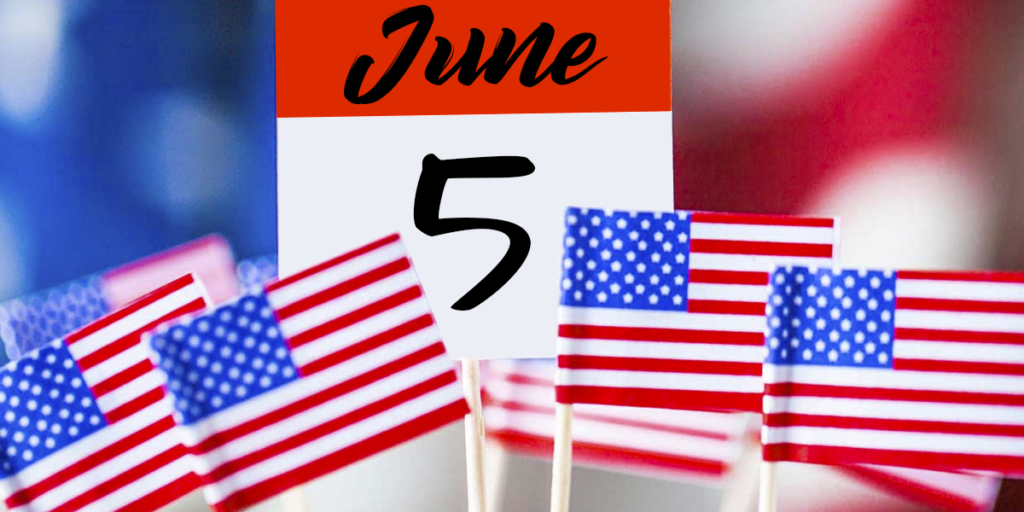
Big decisions will be made Tuesday as Alabamians statewide head to the polls to cast their ballots in the Democratic and Republican primaries. Voters will have from 7 a.m. – 7 p.m. to choose between candidates is races across the state. Here’s what you need to know before you head to the polls: Valid ID A voter can use any of the following forms of photo ID at the polls: Valid driver’s license Valid non-driver ID Valid Alabama photo voter ID Valid state issued ID (Alabama or any other state) Valid federal issued ID Valid US passport Valid employee ID from federal government, State of Alabama, county government, municipality, board, authority, or other entity of this state Valid student or employee ID from a college or university in the State of Alabama (including postgraduate technical or professional schools) Valid military ID Valid tribal ID If you do not have a valid photo ID you may vote only if you are identified by two election officials in the polling place as a voter on the poll list who is eligible to vote and the election officials execute an affidavit stating this. If you do not have a valid photo ID and the election officials are not able to identify you, you must cast a provisional ballot. Polling place Not sure where you vote? You can find your polling place online here by simply entering in the address from which you registered to vote. Sample ballots Your ballot is based on your county and its associated political districts such as School Board, State Legislative Districts, and U.S. Congressional District. You may view the sample ballot for your county here. Candidate profiles. Throughout the election cycle Alabama Today invited all candidates running for office in Alabama this year to complete a questionnaire we believe offers an interesting, albeit, thumbnail sketch of who they are and why they are running. Here are the responses we’ve gotten thus far. Primary procedure Primary elections are held by the political parties to select each party’s nominee for the general election. In the primary, separate party ballots are printed, and the voter must choose between the ballot with Democrats running against other Democrats or the one on which Republicans run against other Republicans. If there are three or more candidates in a race, and if no one receives a majority of the votes cast, then a second primary election or runoff election is held between the two candidates who receive the highest number of votes in the first primary. The winner of this runoff election will be the party nominee. Split ticket voting and the cross-over ban Split-ticket voting is prohibited during the primary and primary runoff phase of the election cycle. Additionally, whatever party a voter chooses to vote with in the primary, they cannot change it in any runoff elections. The ban, signed into law by Governor Kay Ivey last year, “helps the Democrats choose Democratic candidates, it helps the Republicans choose Republican candidates. It just prevents the cross-over voting so you get a pure general election with a Democrat and a Republican,” Auburn-Republican Sen. Tom Whatley told AL.com, last May. Write-in votes Because primary and primary runoff elections are political party functions, a voter may choose only among those names the political parties place on their ballots. Therefore, the voter may not write-in a vote in a primary or primary runoff election. Voter fraud If you experience any issues at the polling place contact the Statewide Elections & Voter Fraud Hotline: 1-800-274-VOTE (8683).
It’s Election Day in Alabama — who will win?
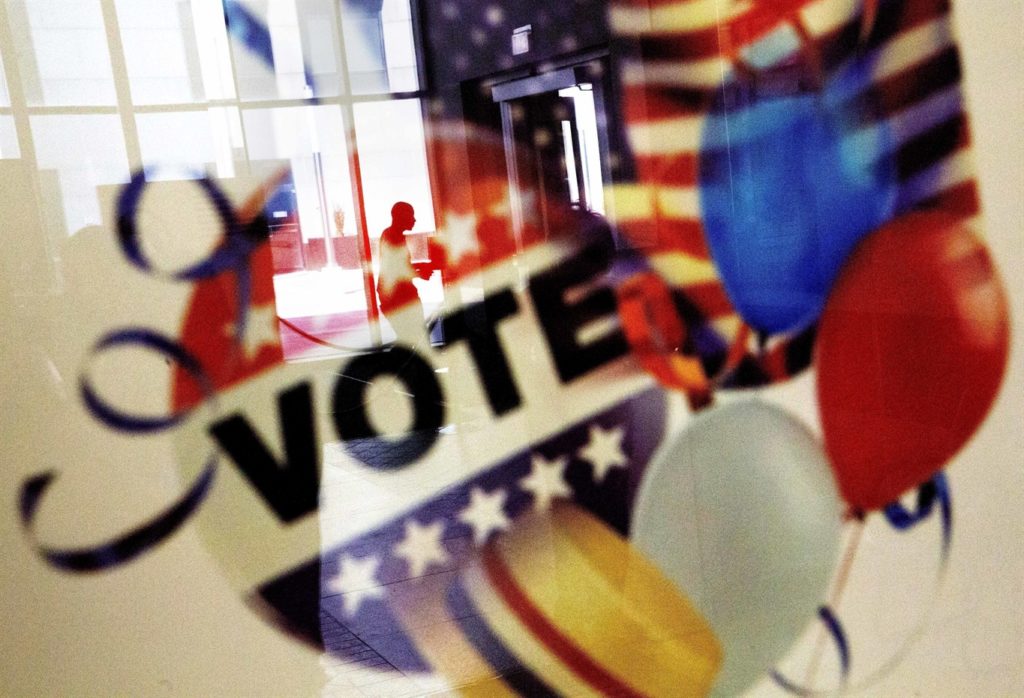
The eyes of the nation are on Alabama Tuesday as voters head to the polls to cast their ballots in a special Senate election where they will decide whether the long-time red state will turn blue. Their choice: Alabama’s former chief justice and embattled conservative Republican candidate Roy Moore or former federal prosecutor Democratic candidate Doug Jones. Jones is hoping to pull off an upset victory in the deeply conservative southern state where he’s hoping to capitalize on divisions within the Alabama GOP stemming from chaos surrounding their candidate. What’s going on in Alabama? Moore’s campaign has been clouded by allegations of sexual misconduct since The Washington Post published an explosive report on Thursday Nov. 9 with the accounts of four women who claim he sexually pursued them when he was in his 30s and they were in their teens. Since that time, five more woman have come forward with similar accusations against Moore. Moore has vehemently denied the allegations since they first surfaced. Meanwhile, Jones is a traditional Democrat. The former U.S. attorney aligns with his party on issues ranging from universal healthcare to abortion access. He is notably pro-choice in a state that hasn’t had a Democratic U.S. senator since Howell Heflin twenty years ago. Who’s going to win? It’s anybody’s game. Despite all the drama surrounding the campaign, Moore is favored to win — let’s not forget President Donald Trump won Alabama by 28 points in 2016 — and a recent CBS News poll shows him leading Jones, 49 percent to 43 percent. Meanwhile, Fox News released a poll Monday that had Jones up ten. Timeline Voters have 12 hours to decide between Moore and Jones. The polls open at 7 a.m. and close at 7 p.m.


